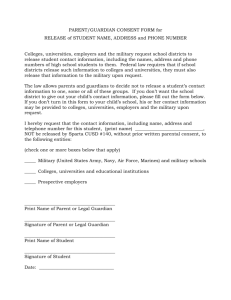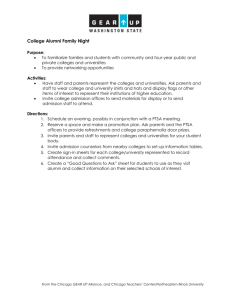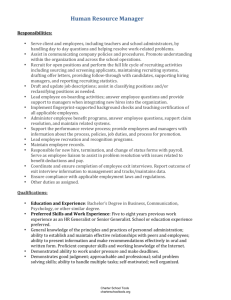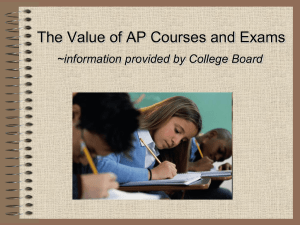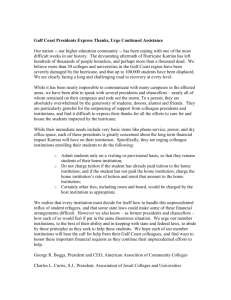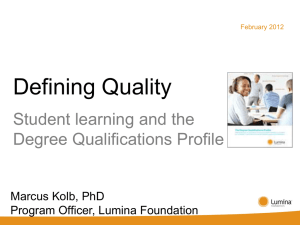News: Not-So-Secret Agents - Inside Higher Ed
advertisement
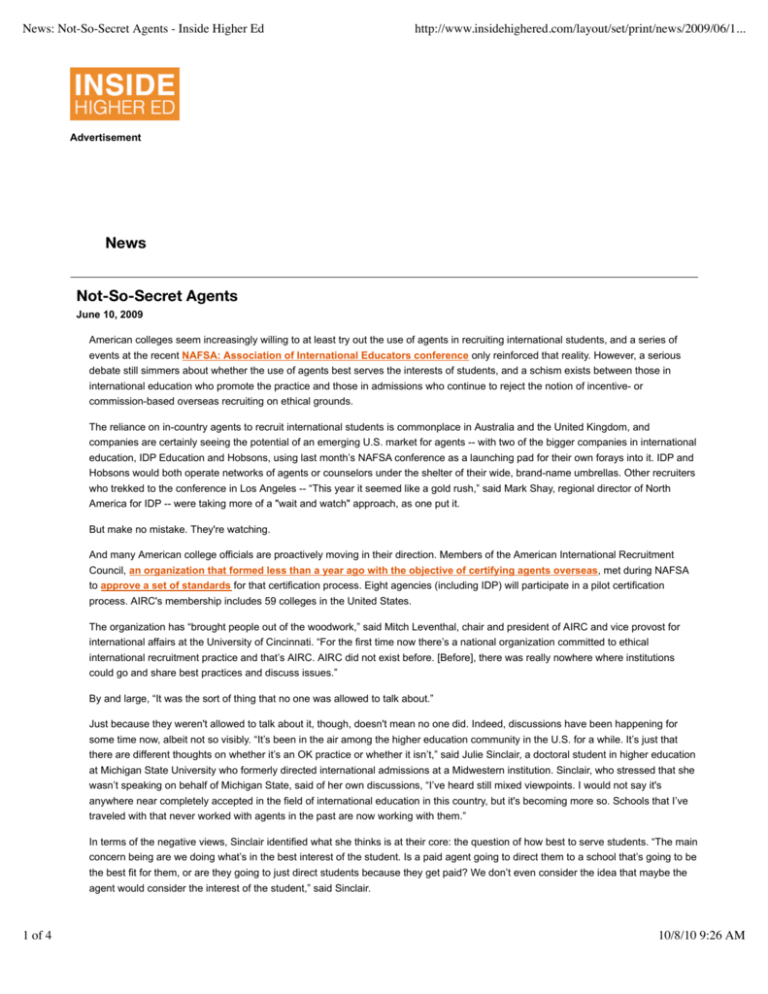
News: Not-So-Secret Agents - Inside Higher Ed http://www.insidehighered.com/layout/set/print/news/2009/06/1... Advertisement News Not-So-Secret Agents June 10, 2009 American colleges seem increasingly willing to at least try out the use of agents in recruiting international students, and a series of events at the recent NAFSA: Association of International Educators conference only reinforced that reality. However, a serious debate still simmers about whether the use of agents best serves the interests of students, and a schism exists between those in international education who promote the practice and those in admissions who continue to reject the notion of incentive- or commission-based overseas recruiting on ethical grounds. The reliance on in-country agents to recruit international students is commonplace in Australia and the United Kingdom, and companies are certainly seeing the potential of an emerging U.S. market for agents -- with two of the bigger companies in international education, IDP Education and Hobsons, using last month’s NAFSA conference as a launching pad for their own forays into it. IDP and Hobsons would both operate networks of agents or counselors under the shelter of their wide, brand-name umbrellas. Other recruiters who trekked to the conference in Los Angeles -- “This year it seemed like a gold rush,” said Mark Shay, regional director of North America for IDP -- were taking more of a "wait and watch" approach, as one put it. But make no mistake. They're watching. And many American college officials are proactively moving in their direction. Members of the American International Recruitment Council, an organization that formed less than a year ago with the objective of certifying agents overseas, met during NAFSA to approve a set of standards for that certification process. Eight agencies (including IDP) will participate in a pilot certification process. AIRC's membership includes 59 colleges in the United States. The organization has “brought people out of the woodwork,” said Mitch Leventhal, chair and president of AIRC and vice provost for international affairs at the University of Cincinnati. “For the first time now there’s a national organization committed to ethical international recruitment practice and that’s AIRC. AIRC did not exist before. [Before], there was really nowhere where institutions could go and share best practices and discuss issues.” By and large, “It was the sort of thing that no one was allowed to talk about.” Just because they weren't allowed to talk about it, though, doesn't mean no one did. Indeed, discussions have been happening for some time now, albeit not so visibly. “It’s been in the air among the higher education community in the U.S. for a while. It’s just that there are different thoughts on whether it’s an OK practice or whether it isn’t,” said Julie Sinclair, a doctoral student in higher education at Michigan State University who formerly directed international admissions at a Midwestern institution. Sinclair, who stressed that she wasn’t speaking on behalf of Michigan State, said of her own discussions, “I’ve heard still mixed viewpoints. I would not say it's anywhere near completely accepted in the field of international education in this country, but it's becoming more so. Schools that I’ve traveled with that never worked with agents in the past are now working with them.” In terms of the negative views, Sinclair identified what she thinks is at their core: the question of how best to serve students. “The main concern being are we doing what’s in the best interest of the student. Is a paid agent going to direct them to a school that’s going to be the best fit for them, or are they going to just direct students because they get paid? We don’t even consider the idea that maybe the agent would consider the interest of the student,” said Sinclair. 1 of 4 10/8/10 9:26 AM News: Not-So-Secret Agents - Inside Higher Ed http://www.insidehighered.com/layout/set/print/news/2009/06/1... At the same time, she said, her colleagues are increasingly starting to question the main assumption behind that concern. “Can we assume agents don’t work in the interest of the student, and [instead] just like with any organization or any profession, there could be wonderful ones and not-so-good ones?" On Ethics, Contested Terrain Weeding out the wonderful from the not-so-good is essentially the mission of AIRC. But to some, the issue is in fact a more fundamental one, of whether colleges should work with agents -- the good or the bad ones -- on a commission basis at all. The growing acceptance of commission-based recruiting internationally comes at a time when per-capita compensation for recruiters is under increased scrutiny domestically. The federal Higher Education Act restricts such incentive-based compensation when it comes to students who qualify for federal financial aid. The restrictions do not apply to international recruiting, where federal aid is not a factor. Still, a draft code of ethics under consideration by the American Association of Collegiate Registrars and Admissions Officers suggests the principle should apply in practice, if not in law. One section of the draft code stipulates, “Avoid engaging in enrollment practices overseas that would be illegal at home." “We think that’s a reasonable measure. In other words, the burden is on those who believe they are entitled to do something outside the jurisdiction of their home country that they couldn’t do in their immediate surroundings. That’s a reasonable distinction to make, to suggest that as educators we should hold ourselves to a higher standard than simply what is legal,” said Barmak Nassirian, AACRAO’s associate executive director. Nassirian stressed that the code of ethics is still in draft form, and pending additional approvals. However, he believes that, in general, AACRAO’s members are skeptical of per-capita financial incentives. “Because at the end of the day the individual that you rely on to do significant gate-keeping on your behalf is in business for himself and only gets paid on commission. Now if that doesn’t drive a stake through the heart of the integrity of your process, I don’t know what does.” The Standards of Principles of Good Practice for the National Association for College Admission Counseling, meanwhile, ban the payment of commissions or bonuses based on the number of students recruited, with no exception for those recruited overseas. “Based on what we see in the field, interest in commission-based recruiting for overseas students has been catching on,” said David A. Hawkins, NACAC’s director of public policy and research. “Certainly there is evidence that an increasing number of colleges are engaging these commissioned agents in recruiting, but I think, as we look at the ethical principles … the principle that this association has established for ethical practice suggests that commission-based recruiting can be problematic. And just because people are doing it doesn’t necessarily mean that it’s the appropriate practice. I think that’s where a group like Mitch Leventhal’s is attempting to hedge against some of the potentially damaging side effects of commission-based recruiting. But I guess, over the years, our members have seen potential for abuse, even in a regulated system, much like our own system that’s about to be revisited by the Obama administration.” Late last month, the U.S. Department of Education announced a new round of federal rule making, with one priority area being whether the government’s approach to regulating incentive compensation for college recruiters is rigorous enough. Again, the renewed government scrutiny applies only to domestic student recruitment, and primarily to practices in the for-profit college sector. In Anticipation of Demand Tacit agreements to disagree seem to characterize some of the debates on this matter, at least for the moment. More institutions are open about their use of agents than ever before and, for others, the appeal of the model -- in which colleges rely on outside, in-country expertise and pay fees (commissions) only after the successful placement of students -- shouldn't be underestimated. There is, after all, widespread interest in internationalizing campuses in a time of shrinking budgets, and working with agents can bring the promise of reward at little upfront cost. The use of agents has also very much been framed as a competitiveness issue -- one to which U.S. colleges are only just starting to catch on. “We have watched as both our clients in Australia and in the U.K. have adopted this practice for international student marketing and recruitment and it has been a key driver in them building market share of international students against the U.S. I think that many U.S. universities have realized this and understand that for them to compete on a global level, if this is a practice that is acceptable in those countries for universities that they compete with for students, it’s something that they have to look at if they haven’t already,” said Craig Heldman, Hobsons' CEO. 2 of 4 10/8/10 9:26 AM News: Not-So-Secret Agents - Inside Higher Ed http://www.insidehighered.com/layout/set/print/news/2009/06/1... Hobsons, which has long helped universities in the United States recruit international students through marketing and technology strategies, announced the creation of a new “international counselor network” for American institutions during the NAFSA conference. The company has set about the process of creating a “credible portfolio” of universities, representing a broad swath of American higher education, to which a network of counselors under the Hobsons umbrella could refer students. “We think it’s going to be about 45 universities in year 1 to about 100 universities in year 2," maxing out at about 200, said Jeremy Cooper, Hobsons' managing director of integrated marketing solutions. "We’re taking it from the angle, how can we create the perfect selection of universities that will allow the student to have a choice wherever or whatever level of study they want to have in the U.S." "Hobsons isn't becoming an agent. What Hobsons wants to do is leverage its relationship with the U.S. marketplace and also its experience internationally in order to really professionalize parts of this industry and to provide universities with a method so that they feel comfortable with engaging with agents abroad," said Cooper. Of course, Hobsons did some research on the U.S. market before getting into this game. “What we were hearing was there is a loosening of visa restrictions on coming to the U.S., coupled by a real demand by universities to start internationalizing their campuses, for a variety of reasons. One, because domestically, student numbers are plateauing, so they wanted to find alternative sources of students to fill the classroom. Also they’re very interested in the diversity angle, diversifying the classroom, and then there’s the financial element of fee-paying international students,” said Cooper. “That was coupled with the fact that we saw a real sea change in the marketplace in people’s approach to using agents…. Universities were already using agents or were certainly thinking of using agents in the future.” Shay, of IDP, the Australia-based recruiter that also just announced its entrance into the U.S. market, said, too, “The opportunity is ripe. There is almost insatiable demand for an American education, yet the American schools are just not investing in what it takes to reach out and really succeed in recruiting in the local market. Since that seems to be a practice that continues, you just hear more and more -- budget freezes, travel restrictions, not being able to go on the road, yet the schools are just clamoring for this kind of revenue [from fee-paying international students] -- it seems to be the best way to reach this sort of demand" -- the use of agents, that is. IDP, which Shay said recruits about 1 in 5 of the international students who come to Australia, also hopes to develop a “credible portfolio” of U.S. colleges -- “That’s what they hired me for!" said Shay -- “so we could still maintain our principles of focusing on what’s best for the student, not what’s best for a select number of paying clients.” Yet, an agent paid on commission will always represent the menu of colleges he or she has a business relationship with -- it may be a large and diverse menu in the case of the bigger recruiters, but still a limited one. Which is why the Institute of International Education has instead promoted collaboration with the U.S. State Department's network of EducationUSA centers, which are charged with providing objective advice on U.S. higher education opportunities. "IIE still feels that the student is best served by having the widest array of choices presented to them and as much information as possible on the full range of higher education because each student's need is quite different," said Peggy Blumenthal, IIE's executive vice president. "We haven't changed our philosophy, and that's why we work so closely with the EducationUSA Network, which is based on that philosophy. That being said, certainly for an individual school that sees an area of the world where they want to solicit students or find good students and they don't have the resources, they may well make that decision and it may well serve an individual school to go that route" of using agents. “Yes, there is resistance,” said Dipu Sebastian, director of international development for VIEC Education, a recruiting company that has offices in India, Nepal and Sri Lanka. “I think there is very little understanding and therefore the resistance. But having said that, frankly, if we just picked the institutions in the U.S. who are willing to go ahead with this, we’ve got enough on our plate.” From his end, however, Sebastian said VIEC is proceeding cautiously. “We’ve been known to recruit for Australia and the UK, to now re-brand ourselves as an American recruiter, that would again take some time.” He also has some specific concerns about the American market, including the lack of transparency of the U.S. visa process. Entering the U.S. market is "a logical direction" for the company, he said, but at this point, “It’s a wait and see for us, frankly. Wait and watch. Things are still new.” — Elizabeth Redden © Copyright 2010 Inside Higher Ed 3 of 4 10/8/10 9:26 AM News: Not-So-Secret Agents - Inside Higher Ed 4 of 4 http://www.insidehighered.com/layout/set/print/news/2009/06/1... 10/8/10 9:26 AM
